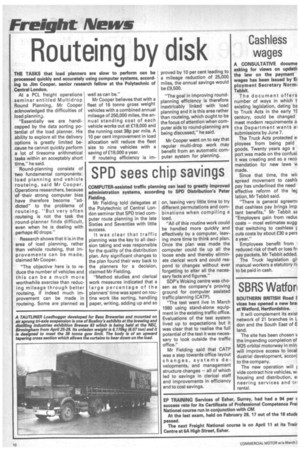SPD sees chip savings
Page 12

If you've noticed an error in this article please click here to report it so we can fix it.
COMPUTER-assisted traffic planning can lead to greatly improved administration systems, according to SPD Distribution's Peter Fielding.
Mr Fielding told delegates at the Polytechnic of Central London seminar that SPD tried computer route planning in the late Sixties and Seventies with little success.
It was clear that traffic planning was the key to all decision taking and was responsible for the quality of the distribution plan. Any significant changes to the plan found their way back to the planners for a decision, claimed Mr Fielding.
"Method studies and clerical work measures indicated that a large percentage of the planners' time was spent on routine work like sorting, handling paper, writing, adding up and so on, leaving very little time to try different permutations and combinations when compiling a load.
"All of this routine work could be handled more quickly and effectively by a computer, leaving more time to think and plan. Once the plan was made the computer could tie up all the loose ends and thereby eliminate clerical work and could respond to changes without ever forgetting to alter all the necessary facts and figures."
SDP's Woking centre was chosen as the company's proving ground for computer assisted traffic planning (CATP).
"The test went live in March 1980 using stand-alone equipment in the existing traffic office. Evaluations of the test system lived up to expectations but it was clear that to realise the full potential of the test it was necessary to look outside the traffic office."
Mr Fielding said that CATP was a step towards office layout changes, systems developments, and management structure changes — all of which led to savings in clerical staff and improvements in efficiency and to cost savings.
















































































